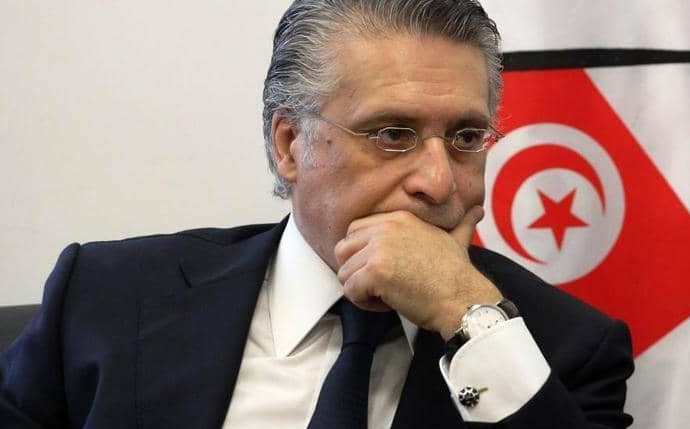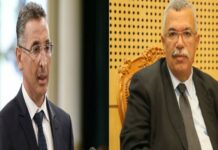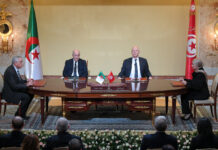Leaks circulated by Tunisian local media regarding the arrest of the head of the Heart of Tunisia party and former presidential candidate Nabil Karoui in Algeria, raised questions about whether the step paves the way for his extradition to the Tunisian authorities.
Local radio “Mosaique” quoted sources it described as informed Sunday, “that the Algerian border security arrested the head of the Heart of Tunisia party, Nabil Karoui, and his brother, the frozen member of parliament, Ghazi Karoui, on Sunday afternoon, in the Algerian region of Tebessa, in an apartment in the city center owned by the brother of a former member of the Algerian parliament.”
The sources reported that the Algerian border security was aware of the Karoui brothers surreptitiously entering Algerian territory without passing through the legal crossings.
According to the radio, an investigation is currently underway with Karoui and the party that secured his hiding place, and it is expected that he will be referred on Monday to the competent public prosecutor in one of the Tebessa courts.
Observers view the arrest of Karoui as a goodwill gesture for Algeria towards Tunisia, amid expectations that he will be handed over to the Tunisian authorities.
The successive visits of Algerian Foreign Minister Ramtane Lamamra to Tunisia and the continuous contacts of President Abdelmadjid Tebboune reflect Algerian concern about the changes taking place in the country since President Kais Saied announced a series of measures paving the way to ending years of Islamist rule, which had good relations with Algeria.
No statement was issued by Karoui regarding the measures announced by Kais Saied, i.e. the freezing of Parliament and the dismissal of Prime Minister Hichem Mechichi, while the positions of his Qalb Tounes party were characterized by confusion and fluctuation.
The party leaders initially opposed the Tunisian president’s measures, but later retracted and announced their support for them, only to return once again to questioning and criticizing them.
Parliament member whose jurisdiction has been suspended, Osama Khelifi, said Saturday that Tunisians are following with concern and confusion the deterioration of the economic, political, human rights and humanitarian conditions in the country due to what he described as a “remarkable deviation in the use of exceptional measures.”
Observers link the party’s fluctuations in positions with fear for the future of its president, Nabil Karoui, who is being prosecuted, and his brother, MP Ghazi Karoui, in addition to suspicions about other MPs mentioned by organizations specialized in fighting corruption, especially after the threats made by the Tunisian president.
Nabil Karoui was released on the fifteenth of last June after the expiry of the legal period for his detention, as Tunisian law stipulates that the period of pre-trial detention is six months. Karoui has often asserted that his judicial follow-up has nothing to do with the accusations leveled against him of money laundering and corruption and linking them to political battles.
Karoui was arrested in 2019 after he announced his intention to run for the presidential elections, taking advantage of the popularity he had gained from a social program broadcast on the Nessma channel, which he owns, and which provides aid to poor families in marginalized regions in the country.
Karoui ran in the first round of the elections in prison, then ran in the second round after his release, during which he lost to Kais Saied.
Observers linked his arrest and release to his volatile relationship with Ennahda, and they attributed his release last June to his alliance with the movement.
The movement’s head, Rached Ghannouchi, sparked widespread controversy in the country when he confirmed last January that the judiciary would acquit Karoui, which was considered interference in the work of the judiciary.
Translation based on an article published in Arabic in Al-Arab Newspaper. Monday, August 30, 2021.
https://bit.ly/3zuGAZK











